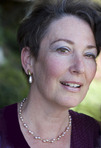Uvi Poznansky's Blog, page 189
September 13, 2014
A reimagining page-turner
Paul Atreides is an author and playwright, and is currently a theater critic for the Las Vegas Review-Journal. He's written numerous articles for a variety of periodicals and been a guest columnist, and a monthly column. I am thrilled to find his review for A Favorite Son:
A reimagining page-turnerBy Paul Atreideson September 12, 2014Format: Paperback
 As an author myself, I found this reimagining of an ancient parable so intriguing and so well thought out that once I started, I couldn't put it down. It's a page-turner of family greed, and while you think you may know how it's going to end Poznansky has more than a few surprises for you along the way.
As an author myself, I found this reimagining of an ancient parable so intriguing and so well thought out that once I started, I couldn't put it down. It's a page-turner of family greed, and while you think you may know how it's going to end Poznansky has more than a few surprises for you along the way.
I especially loved the changing of vernacular. It kept you grounded in a world of the past, but made you understand this tale is played out in the here and now, all over the world, in family after family, from the poorest to the top one percent.
I admit I've had the book for a long while and kept putting it off, dropping it to the bottom of the To Read pile; we authors have a tendency to get caught up in our own make-believe worlds to the detriment of all else. But, I so thoroughly enjoyed this novella I can't wait to delve into more of this author's works. She's got a lovely and artistic way with words that pulls you in from the moment you read the first sentence.
A reimagining page-turnerBy Paul Atreideson September 12, 2014Format: Paperback
 As an author myself, I found this reimagining of an ancient parable so intriguing and so well thought out that once I started, I couldn't put it down. It's a page-turner of family greed, and while you think you may know how it's going to end Poznansky has more than a few surprises for you along the way.
As an author myself, I found this reimagining of an ancient parable so intriguing and so well thought out that once I started, I couldn't put it down. It's a page-turner of family greed, and while you think you may know how it's going to end Poznansky has more than a few surprises for you along the way.I especially loved the changing of vernacular. It kept you grounded in a world of the past, but made you understand this tale is played out in the here and now, all over the world, in family after family, from the poorest to the top one percent.
I admit I've had the book for a long while and kept putting it off, dropping it to the bottom of the To Read pile; we authors have a tendency to get caught up in our own make-believe worlds to the detriment of all else. But, I so thoroughly enjoyed this novella I can't wait to delve into more of this author's works. She's got a lovely and artistic way with words that pulls you in from the moment you read the first sentence.
Published on September 13, 2014 20:43
September 12, 2014
#Kindle #Countdown #Deal: Apart From Love
Apart from love you shouldn't beTake my book, it is for thee!

★ Love reading? Download this book now ★And while you get it, check out the audio edition, too! Apart From Love
Secrets, passion, betrayal...Written with passionate conviction, this story is being recorded by two of its characters: Ben, a twenty-seven years old student, and Anita, a plain-spoken, spunky, uneducated redhead, freshly married to Lenny, his aging father. Behind his back, Ben and Anita find themselves increasingly drawn to each other. They take turns using an old tape recorder to express their most intimate thoughts, not realizing at first that their voices are being captured by him.
Meanwhile, Lenny is trying to keep a secret from both of them: his ex-wife, Ben's mother, a talented pianist, has been stricken with early-onset alzheimer. Taking care of her gradually weighs him down. What emerges in these characters is a struggle, a desperate, daring struggle to find a path out of conflicts, out of isolation, from guilt to forgiveness.
These tapes hold the secret of the story. As one of the characters concludes, "I wish I could be more confident of its veracity and completeness. I wish I could do more. This, I suppose, is the nature of the quest for truth--even if it is truth in fiction."
Where does the title, Apart From Love, come from?
The word Love is used sparingly in the novel, which makes it ever more precious. The title comes from a phrase used three times in the story:
After a while I whispered, like, "Just say something to me. Anything." And I thought, Any other word apart from Love, 'cause that word is diluted, and no one knows what it really means, anyway.
Anita
Why, why can't you say nothing? Say any word--but that one, 'cause you don't really mean it. Nobody does. Say anything, apart from Love.
Anita
For my own sake I should have been much more careful. Now--even in her absence--I find myself in her hands, which feels strange to me. I am surrounded--and at the same time, isolated. I am alone. I am apart from Love.
Ben
US: September 13 2:00am PSTPrice discounted to $0.99
September 14 11:00am PSTPromotional price increases to $1.99
September 15 8:00pm PSTPromotional price increases to $2.99
September 17 5:00am PSTPromotional price increases to $3.99
September 18 3:00pm PSTPromotional price increases to $4.99
September 20 12:00am PSTPrice returns to original list price of $5.99
UK:September 13 5:00am GMTPrice discounted to £0.99
September 15 11:00pm GMT
Promotional price increases to
£1.99
September 17 5:00pm GMT
Promotional price increases to
£2.99
September 20 12:00am GMT
Price returns to original list price of
£3.49

★ Love reading? Download this book now ★And while you get it, check out the audio edition, too! Apart From Love
Secrets, passion, betrayal...Written with passionate conviction, this story is being recorded by two of its characters: Ben, a twenty-seven years old student, and Anita, a plain-spoken, spunky, uneducated redhead, freshly married to Lenny, his aging father. Behind his back, Ben and Anita find themselves increasingly drawn to each other. They take turns using an old tape recorder to express their most intimate thoughts, not realizing at first that their voices are being captured by him.
Meanwhile, Lenny is trying to keep a secret from both of them: his ex-wife, Ben's mother, a talented pianist, has been stricken with early-onset alzheimer. Taking care of her gradually weighs him down. What emerges in these characters is a struggle, a desperate, daring struggle to find a path out of conflicts, out of isolation, from guilt to forgiveness.
These tapes hold the secret of the story. As one of the characters concludes, "I wish I could be more confident of its veracity and completeness. I wish I could do more. This, I suppose, is the nature of the quest for truth--even if it is truth in fiction."
Where does the title, Apart From Love, come from?
The word Love is used sparingly in the novel, which makes it ever more precious. The title comes from a phrase used three times in the story:
After a while I whispered, like, "Just say something to me. Anything." And I thought, Any other word apart from Love, 'cause that word is diluted, and no one knows what it really means, anyway.
Anita
Why, why can't you say nothing? Say any word--but that one, 'cause you don't really mean it. Nobody does. Say anything, apart from Love.
Anita
For my own sake I should have been much more careful. Now--even in her absence--I find myself in her hands, which feels strange to me. I am surrounded--and at the same time, isolated. I am alone. I am apart from Love.
Ben
US: September 13 2:00am PSTPrice discounted to $0.99
September 14 11:00am PSTPromotional price increases to $1.99
September 15 8:00pm PSTPromotional price increases to $2.99
September 17 5:00am PSTPromotional price increases to $3.99
September 18 3:00pm PSTPromotional price increases to $4.99
September 20 12:00am PSTPrice returns to original list price of $5.99
UK:September 13 5:00am GMTPrice discounted to £0.99
September 15 11:00pm GMT
Promotional price increases to
£1.99
September 17 5:00pm GMT
Promotional price increases to
£2.99
September 20 12:00am GMT
Price returns to original list price of
£3.49
Published on September 12, 2014 17:14
#Free #download: A PEEK AT BATHSHEBA
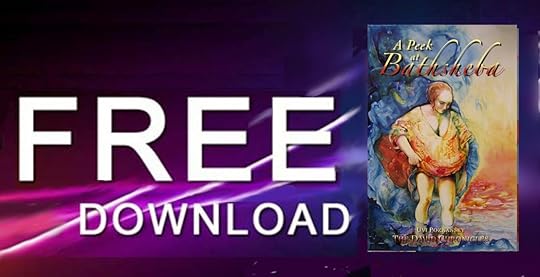
★ Love reading? Get this book now ★The David ChroniclesVolume II: A Peek at Bathsheba Free September 13-14
Against the backdrop of wars, raging within the land and without, David is growing into the mantle of leadership. Between his anointment as a tribal king and his anointment as the king of all of Israel, he uses wisdom, cunning, and his own understanding of the forces of history, aiming for high ideals: stopping the bloodshed, uniting the nation, and bringing about healing and peace.
But then, having reached his peak, David falters. He makes a serious error that threatens to undo his political success, and cost him not only the adoration of his people—but also the sense of being sustained by a divine power. That error is the most torrid tale of passion ever told: his deliciously forbidden love for Bathsheba, followed by his attempt to cover up the ensuing scandal by sending her husband—who serves him faithfully in his army—to his death.
This is volume II of the trilogy The David Chronicles, told candidly by the king himself. David uses modern language, indicating that this is no fairytale. Rather, it is a story that is happening here and now. Listen to his voice as he undergoes a profound change, realizing the magnitude of his sin, and the curse looming over his entire future.
Published on September 12, 2014 17:12
September 11, 2014
Alzheimer's: what does it take tell your son the truth about his mother?
And so, I charge him, “It is always secrets with you. I hate you for that." Which, to my surprise, he accepts. "I hate it too,” he admits. “Having to have secrets."“With mom,” I say, “things are simpler. You know, from time to time she would tell me something about herself. She would write to me, even.”“Oh yeah?” he says. “And how long ago was that?”I figure that the last note I received from mom was—let’s see—at least two years ago, maybe three. It amazes me now that all this time, I have given little thought, if any, to the silence between us. I suppose I did not feel like telling her about myself, because around that time I quit everything. I left my studies at the Facoltà di Medicina e Chirurgia in the university of Firenze, after only a couple of years. And so, I figured, the less letters from my parents—the better. I isolated myself, and attributed the sporadic nature of our correspondence to the frequent changes of my address, as I moved often, from one place to another across Italy.“And her handwriting,” says my father, pressing steadily ahead. “To you, son, was it clear?”Her beautiful handwriting. It is engraved in my memory. As a child, I used to study it and copy it repeatedly, beginning at age five, when she wrapped her hand over mine, and taught me how to hold a pen. Between the first and middle fingers, she said, and hold it in place like this, by the thumb. Mom used to draw text with the nib of a calligraphy pen. She would produce a smooth, fluent line, changing it—as if by a magic wand—from thick to thin, connecting the end of one glyph to the beginning of the another, with a stroke that was so fine, truly, fine to the point of becoming invisible, almost. It had such a consistent slant, just like that monogram, embroidered on her silk sheets. But then, this note—the last note she sent me—which I can see before my eyes as if it were right here, rustling in my hands, this one, I must admit, was different. It had none of these delicate pen strokes. On the contrary, here was an ugly mess. The words were scattered. Some of them were scratched over, as if some frenzied chickens got loose on the page. What happened? What could possibly explain this unusual sloppiness?
Ben in Apart From Love
After many years of absence Ben returns to his childhood home, and finds himself faced with a truth that he has so far managed to hide from himself: his mother, a gifted pianist with a training in memorization technique, has been diagnosed with early-onset Alzheimer's. His father, Lenny, who has kept this a secret until now, has a hard time relating this fact to his estranged son, and during their first conversation they cast heated accusations at each other, in an explosive exchange of guilt and blame. In this excerpt he uses the deterioration in her penmanship to point out a symptom of her infliction, a proof that Ben might accept.

★ Love reading? Get this book ★ Apart From Love★ Audio ★ Ebook ★ Print ★
"A feast for the armchair psychologist. Reveals insights that can touch and frighten each of us"
Ben in Apart From Love
After many years of absence Ben returns to his childhood home, and finds himself faced with a truth that he has so far managed to hide from himself: his mother, a gifted pianist with a training in memorization technique, has been diagnosed with early-onset Alzheimer's. His father, Lenny, who has kept this a secret until now, has a hard time relating this fact to his estranged son, and during their first conversation they cast heated accusations at each other, in an explosive exchange of guilt and blame. In this excerpt he uses the deterioration in her penmanship to point out a symptom of her infliction, a proof that Ben might accept.

★ Love reading? Get this book ★ Apart From Love★ Audio ★ Ebook ★ Print ★
"A feast for the armchair psychologist. Reveals insights that can touch and frighten each of us"
Published on September 11, 2014 16:49
September 10, 2014
I dance with abandon, with no inhibition
Shimmering luster, let me try, let me reach youLayers beyond layers of red, all aglowWith trembling fingers I touch... Flimsy tissueIt comes down upon me, folding high into low
I dance with abandon, with no inhibition,Entangled in fabric, I can no longer fleeCan't breath, for now I can see the strange fusionNow I know: this tissue is me
(This poem is included in my poetry book, Home.)

My poem is inspired by my art: here is my triptych, a set of three oil paintings. I offer it to your interpretation, if the figures are dancing out of joy, or getting themselves tied in utter frustration... When I painted the picture, I likened the red fabric to chewing gum on the floor, into which you step and can never release yourself. The more you fight to free yourself, the more you become entangled.
I did the preparatory work for them by drawing sketches of a nude model, who posed with a silky, red piece of fabric. Then I created a composition out of these sketches. I did a version of this arrangement in a different color scheme, in watercolor. You can see this version on my facebook page. Then I created the version presented here, in oil. Later, the panel on the right provided the inspiration for the cover of my novel, Apart From Love (available on Amazon in its paperback and Kindle editions.)

★ Love reading? Get this book ★ Apart From Love★ Audio ★ Ebook ★ Print ★
"A feast for the armchair psychologist. Reveals insights that can touch and frighten each of us"
I dance with abandon, with no inhibition,Entangled in fabric, I can no longer fleeCan't breath, for now I can see the strange fusionNow I know: this tissue is me
(This poem is included in my poetry book, Home.)

My poem is inspired by my art: here is my triptych, a set of three oil paintings. I offer it to your interpretation, if the figures are dancing out of joy, or getting themselves tied in utter frustration... When I painted the picture, I likened the red fabric to chewing gum on the floor, into which you step and can never release yourself. The more you fight to free yourself, the more you become entangled.
I did the preparatory work for them by drawing sketches of a nude model, who posed with a silky, red piece of fabric. Then I created a composition out of these sketches. I did a version of this arrangement in a different color scheme, in watercolor. You can see this version on my facebook page. Then I created the version presented here, in oil. Later, the panel on the right provided the inspiration for the cover of my novel, Apart From Love (available on Amazon in its paperback and Kindle editions.)

★ Love reading? Get this book ★ Apart From Love★ Audio ★ Ebook ★ Print ★
"A feast for the armchair psychologist. Reveals insights that can touch and frighten each of us"
Published on September 10, 2014 07:18
September 9, 2014
How do we preserve memory, how do we lose it?
I picture her staring at the black-and-white image of her brain, not quite understanding what they are telling her. The doctors, they point out the overall loss of brain tissue, the enlargement of the ventricles, the abnormal clusters between nerve cells, some of which are already dying, shrouded eerily by a net of frayed, twisted strands. They tell her about the shriveling of the cortex, which controls brain functions such as remembering and planning. And that is the moment when in a flash, mom can see clearly, in all shades of gray blooming there, on that image, how it happens, how her past and her future are slowly, irreversibly being wiped away—until she is a woman, forgotten.
Ben in Apart From Love
How do we preserve memory, how do we lose it? I am fascinated by these questions. My novel, Apart From Love, is inspired by the affect of Alzheimer's not only on the afflicted but on the entire family.
Ben's mother used to be a gifted pianist and is now stricken by early-onset Alzheimer’s, a rare form of the disease that appears in younger patients than usual. In her profession she depends on her brain, and the fear of losing control is paralyzing. It takes a while for Ben to fully realize that her mind betrays her. Here he imagines her reaction when she is given the diagnosis, after many years of being misdiagnosed.
 My charcoal drawing, depicting loss
My charcoal drawing, depicting loss
★ Love reading? Get this book ★
Apart From Love★ Audio ★ Ebook ★ Print ★
“A very passionate book! Gripping, riveting, and fascinating!”
Ben in Apart From Love
How do we preserve memory, how do we lose it? I am fascinated by these questions. My novel, Apart From Love, is inspired by the affect of Alzheimer's not only on the afflicted but on the entire family.
Ben's mother used to be a gifted pianist and is now stricken by early-onset Alzheimer’s, a rare form of the disease that appears in younger patients than usual. In her profession she depends on her brain, and the fear of losing control is paralyzing. It takes a while for Ben to fully realize that her mind betrays her. Here he imagines her reaction when she is given the diagnosis, after many years of being misdiagnosed.
 My charcoal drawing, depicting loss
My charcoal drawing, depicting loss★ Love reading? Get this book ★
Apart From Love★ Audio ★ Ebook ★ Print ★
“A very passionate book! Gripping, riveting, and fascinating!”
Published on September 09, 2014 10:12
September 8, 2014
King David, his folly, his Bathsheba - a modern Biblical romance
Author of War Songs, Grady Harp describes himself as being ever on the alert for the new and promising geniuses of tomorrow. He is an artist representative, gallery owner, writer of essays and articles on figurative and all Representational art for museum catalogues and for traveling exhibitions, and an Amazon Hall of Fame Reviewer. I am honored that he has posted this five-star review for A Peek at Bathsheba:
King David, his folly, his Bathsheba - a modern Biblical romanceBy Grady HarpHALL OF FAMETOP 100 REVIEWERVINE VOICEon September 7, 2014Format: Kindle Edition
 Uvi Poznansky wears a coat of many colors. Originally from Israel where she studied Architecture and Town Planning then moving to the US where she studied Computer Science and became an expert in Software Engineering, Poznansky managed to combine the design elements of two studies into unique formats. And she has accomplished the same with the other side of her brain - making visual her ideas (she is an accomplished painter, drawer, and sculptor who has enjoyed exhibitions both in Israel and in California, her present base) and making words in poetry and in short stories and children's books. A PEEK AT BATHSHEBA is her THIRD novel and is adorned on the cover with an image of her own painting!
Uvi Poznansky wears a coat of many colors. Originally from Israel where she studied Architecture and Town Planning then moving to the US where she studied Computer Science and became an expert in Software Engineering, Poznansky managed to combine the design elements of two studies into unique formats. And she has accomplished the same with the other side of her brain - making visual her ideas (she is an accomplished painter, drawer, and sculptor who has enjoyed exhibitions both in Israel and in California, her present base) and making words in poetry and in short stories and children's books. A PEEK AT BATHSHEBA is her THIRD novel and is adorned on the cover with an image of her own painting!
But the miracle of Uvi Poznansky's writing is her uncanny ability to return to old stories and make them brilliantly fresh. This retelling of the Biblical David unveils a character far more profound and fragile than the slayer of Goliath. His personality radiates from every page as he grows from valiant lad to eloquent hero. In this novel, the author's synopsis serves the book well: 'Against the backdrop of wars, raging within the land and without, David is growing into the mantle of leadership. Between his anointment as a tribal king and his anointment as the king of all of Israel, he uses wisdom, cunning, and his own understanding of the forces of history, aiming for high ideals: stopping the bloodshed, uniting the nation, and bringing about healing and peace. But then, having reached his peak, David falters. He makes a serious error that threatens to undo his political success, and cost him not only the adoration of his people--but also the sense of being sustained by a divine power. That error is the most torrid tale of passion ever told: his deliciously forbidden love for Bathsheba, followed by his attempt to cover up the ensuing scandal by sending her husband--who serves him faithfully in his army--to his death.
David uses modern language, indicating that this is no fairytale. Rather, it is a story that is happening here and now. Listen to his voice as he undergoes a profound change, realizing the magnitude of his sin, and the curse looming over his entire future.'
Poznansky's gift for poetry renders a magical hue to every aspect of this story. At times startling, as times awe-inspiring, and at all times fine reading, this is a welcome addition to the growing library of one our more important writers. Grady Harp, September 14
King David, his folly, his Bathsheba - a modern Biblical romanceBy Grady HarpHALL OF FAMETOP 100 REVIEWERVINE VOICEon September 7, 2014Format: Kindle Edition
 Uvi Poznansky wears a coat of many colors. Originally from Israel where she studied Architecture and Town Planning then moving to the US where she studied Computer Science and became an expert in Software Engineering, Poznansky managed to combine the design elements of two studies into unique formats. And she has accomplished the same with the other side of her brain - making visual her ideas (she is an accomplished painter, drawer, and sculptor who has enjoyed exhibitions both in Israel and in California, her present base) and making words in poetry and in short stories and children's books. A PEEK AT BATHSHEBA is her THIRD novel and is adorned on the cover with an image of her own painting!
Uvi Poznansky wears a coat of many colors. Originally from Israel where she studied Architecture and Town Planning then moving to the US where she studied Computer Science and became an expert in Software Engineering, Poznansky managed to combine the design elements of two studies into unique formats. And she has accomplished the same with the other side of her brain - making visual her ideas (she is an accomplished painter, drawer, and sculptor who has enjoyed exhibitions both in Israel and in California, her present base) and making words in poetry and in short stories and children's books. A PEEK AT BATHSHEBA is her THIRD novel and is adorned on the cover with an image of her own painting!But the miracle of Uvi Poznansky's writing is her uncanny ability to return to old stories and make them brilliantly fresh. This retelling of the Biblical David unveils a character far more profound and fragile than the slayer of Goliath. His personality radiates from every page as he grows from valiant lad to eloquent hero. In this novel, the author's synopsis serves the book well: 'Against the backdrop of wars, raging within the land and without, David is growing into the mantle of leadership. Between his anointment as a tribal king and his anointment as the king of all of Israel, he uses wisdom, cunning, and his own understanding of the forces of history, aiming for high ideals: stopping the bloodshed, uniting the nation, and bringing about healing and peace. But then, having reached his peak, David falters. He makes a serious error that threatens to undo his political success, and cost him not only the adoration of his people--but also the sense of being sustained by a divine power. That error is the most torrid tale of passion ever told: his deliciously forbidden love for Bathsheba, followed by his attempt to cover up the ensuing scandal by sending her husband--who serves him faithfully in his army--to his death.
David uses modern language, indicating that this is no fairytale. Rather, it is a story that is happening here and now. Listen to his voice as he undergoes a profound change, realizing the magnitude of his sin, and the curse looming over his entire future.'
Poznansky's gift for poetry renders a magical hue to every aspect of this story. At times startling, as times awe-inspiring, and at all times fine reading, this is a welcome addition to the growing library of one our more important writers. Grady Harp, September 14
Published on September 08, 2014 13:38
September 7, 2014
At the core, what does home mean to you?
At the core, what does home mean to you? When you close your eyes, what image comes to mind? For me, the image that best captures the essence of this word was painted when I was ten years old. Outlined with simple pencil lines, brushed in a flat manner with Gouache paints, and perceived through a head-on perspective, this is a scene of the 'golden age' of my family:
Here we are, my father, mother and I, dancing the Twist (or at least, learning to do so) in unison. In the left corner you can spot the radio (set on an end table); in the right corner is a hanging lamp, on the wall over our head is a framed landscape, under our feet is a beautiful persian rug, the pillows on the red sofa seem to dance as well, or at least they are balanced on a point... And most importantly, all three of us are feeling the same beat. This, to me, is not just a picture of home; it is a picture of happiness. It is what was lost in later years, when my parents separated.
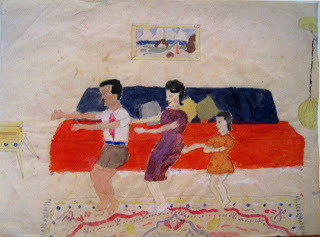
Later in his life, when left alone in this space, my father painted it and through the walls he connected it to the memory of his childhood home. You can see the same red sofa, the framed landscape, the Persian rug... But not a living soul. The place is empty, and he filled it but conjuring the image of his mother rocking the cradle.
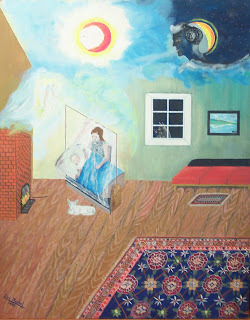
Later still, when he passed away, this space transformed once again in my mind. The landscape faded away from its frame, and it is barely hanging, barely clinging to the wall. The designs on the Persian rug have faded out too. It has multiplied into layers of blank paper that are swaying under your feet. The lamp is not just hanging, it is swinging wildly, giving a rhythm to the gusts of wind that threaten to destroy this place. It has already kicked the end table (where the radio used to stand in the first image, and where later my father would put his pen and notebook) upside down.
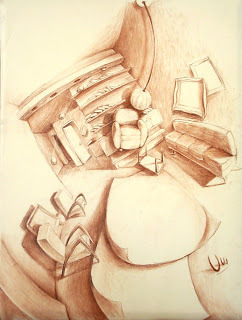
Which brings me to this moment, where again--to fill the emptiness of this space I conjured up a spirit, a muse that with great pity takes the place, in its entirety, into her arms; embraces it, and mourns not only the passing of my father, but all the lives lived between these walls, and moved on and away.
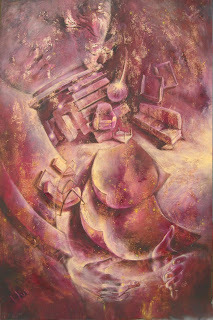
★ Love poetry? Get this book ★Home
★ Audio ★ Ebook ★ Print ★
"I have seen no other book like this. It is superb, exquisite, a literary duo that rivals the musical duo of Natalie and Nat King Cole in every way."
Here we are, my father, mother and I, dancing the Twist (or at least, learning to do so) in unison. In the left corner you can spot the radio (set on an end table); in the right corner is a hanging lamp, on the wall over our head is a framed landscape, under our feet is a beautiful persian rug, the pillows on the red sofa seem to dance as well, or at least they are balanced on a point... And most importantly, all three of us are feeling the same beat. This, to me, is not just a picture of home; it is a picture of happiness. It is what was lost in later years, when my parents separated.

Later in his life, when left alone in this space, my father painted it and through the walls he connected it to the memory of his childhood home. You can see the same red sofa, the framed landscape, the Persian rug... But not a living soul. The place is empty, and he filled it but conjuring the image of his mother rocking the cradle.

Later still, when he passed away, this space transformed once again in my mind. The landscape faded away from its frame, and it is barely hanging, barely clinging to the wall. The designs on the Persian rug have faded out too. It has multiplied into layers of blank paper that are swaying under your feet. The lamp is not just hanging, it is swinging wildly, giving a rhythm to the gusts of wind that threaten to destroy this place. It has already kicked the end table (where the radio used to stand in the first image, and where later my father would put his pen and notebook) upside down.

Which brings me to this moment, where again--to fill the emptiness of this space I conjured up a spirit, a muse that with great pity takes the place, in its entirety, into her arms; embraces it, and mourns not only the passing of my father, but all the lives lived between these walls, and moved on and away.

★ Love poetry? Get this book ★Home
★ Audio ★ Ebook ★ Print ★
"I have seen no other book like this. It is superb, exquisite, a literary duo that rivals the musical duo of Natalie and Nat King Cole in every way."
Published on September 07, 2014 15:14
A single ray of sun cuts across his ashen cheek, leaving his eyes in the shadows
I sit down beside her, and brush a strand of hair from her damp forehead. Only now—by her pale face and the dark circles under her eyes—do I realize how exhausted she must be.“Perhaps,” I say, thinking aloud, “I should be going.”Pointing at the crib by her side, “Help me now,” says Bathsheba. “Give me the child.”And so, leaning over the crib, I take a look at him. His face is perfect, angelic. A single ray of sun cuts across his ashen cheek, leaving his eyes in the shadows. Along its diagonal way, it touches the tips of his delicate, nearly transparent fingers. I lift the baby into a kiss. Then, very gently, I place him into her embrace. Standing back I watch the two of them, mother and child. She bares her breast and brings him in, tilting herself into his little mouth, but the baby is too sleepy, it seems, to suck her milk. I get up, and walk away to the sound of her voice singing a melodious lullaby, at the end of which it trails off, ever so tenderly, into sadness.
David in A Peek at Bathsheba
This passage in my book is inspired by bible illustrations (published 1952-1860) by Julius Schnorr von Carolsfeld, a German painter associated with the Nazerene movement, which sought to revive honesty and spirituality in Christian art.
This particular illustration, Showing Bathsheba agonizing over her dying baby, has always amazed me because of this question: How did the artist manage to make the baby look sick? When drawing a baby, the cuteness gets in the way of showing anything else but hope and promise. I had to look closer, which is when I discovered that the artist used light, that cuts across the baby's cheek, which is equivalent to crossing him off. That idea is what I used in my description of the dying baby.
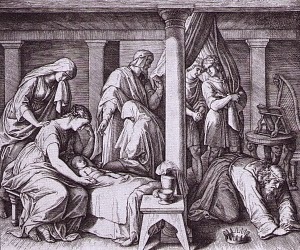 Julius Schnorr von Carolsfeld, David praying for the life of his son
Julius Schnorr von Carolsfeld, David praying for the life of his son
 Detail
Detail
Volume II of the trilogy:
A Peek at Bathsheba
(Audio coming soon)
★ Audio ★ Ebook ★ Print ★
Volume I of the trilogy: Rise to Power★ Audio ★ Ebook ★ Print ★
"Written with the artistic grace that is her signature style. She writes with a calm, steady hand that plucks the strings of her tale with lyrical precision that leaves the reader deeply entrenched in her words long after the last page"
David in A Peek at Bathsheba
This passage in my book is inspired by bible illustrations (published 1952-1860) by Julius Schnorr von Carolsfeld, a German painter associated with the Nazerene movement, which sought to revive honesty and spirituality in Christian art.
This particular illustration, Showing Bathsheba agonizing over her dying baby, has always amazed me because of this question: How did the artist manage to make the baby look sick? When drawing a baby, the cuteness gets in the way of showing anything else but hope and promise. I had to look closer, which is when I discovered that the artist used light, that cuts across the baby's cheek, which is equivalent to crossing him off. That idea is what I used in my description of the dying baby.
 Julius Schnorr von Carolsfeld, David praying for the life of his son
Julius Schnorr von Carolsfeld, David praying for the life of his son Detail
DetailVolume II of the trilogy:
A Peek at Bathsheba
(Audio coming soon)
★ Audio ★ Ebook ★ Print ★
Volume I of the trilogy: Rise to Power★ Audio ★ Ebook ★ Print ★
"Written with the artistic grace that is her signature style. She writes with a calm, steady hand that plucks the strings of her tale with lyrical precision that leaves the reader deeply entrenched in her words long after the last page"
Published on September 07, 2014 07:54
September 6, 2014
What an endearing self portrait!
Published on September 06, 2014 08:02


